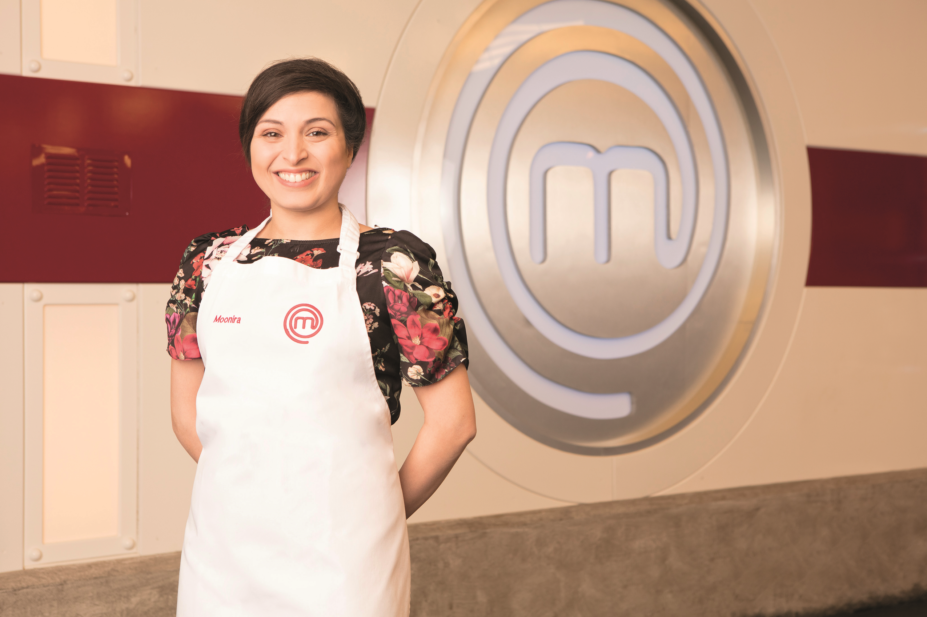
Courtesy of PlankPR
How would you describe your experience of being on MasterChef UK?
Competing in MasterChef UK was a dream come true. I made some lovely friends and completed some incredible challenges cooking for renowned chefs, as well as food and restaurant critics. The whole process was both challenging and exciting at the same time. It is easy to become overwhelmed as you walk through the MasterChef doors and see Gregg Wallace and John Torode for the first time — I had to control my nerves and focus on the task at hand.
I am truly grateful for the whole experience as I have learnt so much. I loved every minute and didn’t want it to end.
What influenced you to apply for MasterChef UK?
I have always been passionate about food and cooking from a young age, and had watched the show religiously. My son Ibrahim (who starred in BBC One’s ‘The A Word’) encouraged me to apply, saying he had absolute faith in me. I was shocked when I got the call to say I was selected for the show.
Where does the inspiration for your cooking come from?
I describe my style of cooking as traditional Indian that is refined for fine dining, with a fusion twist. My inspiration comes from my mother, who learnt all her cooking from my grandma. I am proud of my heritage, and was glad to have the opportunity to provide viewers with a glimpse into traditional Gujarati cuisine. Indian food is sometimes grouped under one roof, but different regions in India have very different cuisines. I tried to showcase some of my childhood favourites on the television show.
Pharmacist’s salaries are similar to what they were two decades ago, with many pharmacists now exploring alternative careers
What is your background in pharmacy?
I studied pharmacy at The University of Bradford, working weekends in the pharmacy department at Keighley Hospital, West Yorkshire. After graduating in 2001, I completed my preregistration year with Boots in Blackburn. I locumed until I married in 2002 and then worked as a pharmacy manager for an independent pharmacy until 2003. I worked again with Boots until 2006, the same year in which my husband (who is also a pharmacist) opened a 100-hour pharmacy with friends from university. In 2012, I bought my own pharmacy and opened my second branch the year after. I now employ 20 members of staff.
What are your thoughts on the current challenges facing community pharmacy?
Community pharmacy faces many challenges at present. Funding for front-line services has stagnated and traditional services — such as appliances, sip feeds, and gluten-free product prescriptions — have now ceased, or been given to central private contractors. At the same time, pharmacists in community are expected to provide health advice and health promotion, be more accessible and act as a triage clinician for the wider public. Significant funding hasn’t been provided for such services. As a result, pharmacist’s salaries are similar to what they were two decades ago, with many pharmacists now exploring alternative careers.
What issues and opportunities currently face pharmacy owners?
With limited funding, businesses are no longer as profitable. As clinical commissioning groups operate in GP surgeries and reduce prescribing, the volume of prescriptions has decreased, and individual turnover for businesses is lower. Consequently, the goodwill value of a pharmacy business declines. Businesses do not have disposable cash to invest in their workforce or offer employees premium wages.
The NHS does however, recognise the skills of pharmacists, with recent advertising campaigns, and new roles within primary care. These new opportunities have to come with additional funding or talented pharmacists will seek other career opportunities.
Pharmacists must have inherent skills in business and enterprise, as well as possess excellent clinical skills
What advice would you give to pharmacists considering pharmacy ownership?
Pharmacy ownership, especially under the current conditions, is very challenging. In order to succeed despite the challenges, pharmacists must have inherent skills in business and enterprise, as well as possess excellent clinical skills. I have fought through tough challenges, including ones that come with being a female, and succeeded. If someone has the energy and commitment, then they should definitely go for it.
Initially, you are not just investing financially but also sacrificing your own time, as well as quality time with family and friends. However, once the business is established, the ability to adapt to the many evolving challenges faced by a healthcare business within the NHS, is very rewarding. Continue to research the various pitfalls and potential events that could negatively impact the business. Invest in good staff who provide brilliant customer and patient-focused service — especially in your absence — and aim to provide excellent front-line care to encourage loyalty.
Many people forget that pharmacists don’t just dispense medication
What is your opinion of how pharmacists are represented in the media?
Pharmacists are rarely represented in the media. Public perception of community pharmacists are of middle-aged men in white coats, counting tablets. Many people forget that we don’t just dispense medication, but are also there to give advice, to help patients live a long and healthy life. As the face of pharmacy is changing, the public are becoming more aware of the role we play within the healthcare system.
While competing in MasterChef UK, many contestants and viewers were intrigued by the role of a pharmacist. I hope that I represented pharmacy in a positive light.
What are your plans after MasterChef UK?
Pharmacy is my profession and since university, I have always aimed to excel in my career. My ultimate goal would be to merge my pharmaceutical knowledge with the fine culinary skills I have acquired to produce food that is nutritious, flavourful and beautiful to look at. I hope to fine tune my skills by working with established gastro chefs and conduct some research into food science. I am inspired by the excellent work of Heston Blumenthal, who uses science to make food incredible and fun.
Being on MasterChef UK has not only fulfilled a dream, but has also affirmed my life passion for cooking. Many doors have opened and I am overwhelmed with the opportunities that have arisen. It is true that if you work hard at what you enjoy and not let barriers get in your way, you will achieve your goals.

